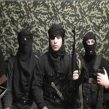
Death of Insurgent Leaders in Kabardino-Balkaria Unlikely to Halt Attacks
Publication: Eurasia Daily Monitor Volume: 8 Issue: 84
By:

On April 29, the Russian security services wiped out the leadership of the insurgency in Kabardino-Balkaria in a single stroke. Ten rebels, including rebel leader Asker Dzhappuev (aka Abdullah), deputy leader Kazbek Tashuev (aka Abdul Dzhabbar) and Ratmir Shameyev (aka Zakaria) were killed in a settlement with the telling name Progress in the border area between Kabardino-Balkaria and the neighboring Russian-speaking Stavropol region. A source in the security services told the RIA Novosti news agency that the authorities had been tipped off about the insurgents’ whereabouts by an informant. Two women along several other lower-ranking insurgents reportedly died in the shootout (www.rian.ru, April 29).
Despite widespread optimism among Russian policymakers, experts warned that the killing of several rebel leaders was a tactical success that would not by itself resolve the underlying causes of instability in the republic. Circassian political commentator Sufian Zhemukhov told the Russian service of the Voice of America that “the ranks of the armed extremist groups by far exceed the number of people killed.” The government authorities should ease up pressure on the Islamized youth in Kabardino-Balkaria to achieve more lasting results, Zhemukhov said. The Voice of America’s experts said both Russia’s presidential election cycle in 2012 and the approaching Winter Olympics in nearby Sochi in 2014 were important factors in the massive destabilization in Kabardino-Balkaria, as Moscow was trying to increase pressure on the radical groups (www.voanews.com, April 29).
Paradoxically, the situation in Kabardino-Balkaria was dramatically destabilized earlier precisely because the security services were so successful in killing off the leader of the rebels, Anzor Astemirov, on March 24, 2010. After one month of regrouping, the defiant rebels stepped up attacks against the government forces at levels Kabardino-Balkaria had not previously seen. Kabardino-Balkaria quickly became one of the hottest spots in the volatile North Caucasus. Reportedly, the new leaders of the insurgents, Asker Dzhappuev and Kazbek Tashuev, were in favor of violent acts against the government forces, unlike their predecessor Astemirov, who preferred the Islamic support base to grow in numbers and strength quietly in order to avoid a massive influx of the Russian military. The change in the leadership of the insurgency in 2010 also marked a shift of power from Circassian leaders in the Kabardino-Balkarian insurgency to the Turkic-speaking Balkars, as both Dzhappuev and Tashuev were ethnic Balkars.
Although on the surface ethnic Circassians (aka Kabardins) and Balkars got on remarkably well within the underground militant ranks, while clashing constantly in the civilian realm, there may have been internal conflicts due to rebel attacks on Circassian nationalists and other factors. One of the slain rebel leaders, 22-year-old Ratmir Shameyev, struggled in a video address to explain why he had killed the Circassian customs and culture promoter Aslan Tsipinov on December 29, 2010. Even though Shameyev himself was a Circassian, his superiors, at least nominally, were Balkars, so it is still plausible the nationalist sentiment may have played a divisive role among the insurgents.
The insurgents’ website Islamdin.com confirmed the death of eight of its leaders the evening of the same day they were killed – April 29. This speedy reaction showed that the rebels’ communications system fared surprisingly well after sustaining such a serious blow. Elsewhere in the North Caucasus, it normally takes several days and sometimes over a week for the insurgents to admit a loss or claim responsibility for an attack. There is a discrepancy between the official number of 10 insurgents killed in Progress settlement, and the eight rebels the insurgents themselves were killed. According to official information, two women were among the slain insurgents – including, reportedly, the Islamic wife of Kazbek Tushuev. Apparently, the rebels’ website did not list the women as combatants, while the government did so automatically (www.islamdin.com, April 29).
Meanwhile, the same day the rebels were killed, Kabardino-Balkaria’s government allotted $1.2 million to set up an extended network of police check-points throughout the republic. The authorities plan to set up the network before mid-May (www.kavkaz-uzel.ru, April 30). According to anecdotal and official information, until recently the police in Kabardino-Balkaria have been so demoralized and helpless that many have left the force’s ranks, while police road checkpoints operate only until midnight. Additional financial infusions by the government must be meant to boost morale in the ranks of the police in this troubled republic, but it is unclear what else is being offered to win over the hearts and minds of the general population.
Kabardino-Balkaria shares multiple features of instability with the other North Caucasian republics, like the absence of space for popular political participation, corruption in the government and high unemployment, among other things. Apart from these, however, the 2014 Winter Olympics to be held near the Black Sea resort of Sochi present the Circassians with a unique dilemma and the opportunity to make their voice heard worldwide. Since the Russian political leadership for one reason or another cherishes the chance to hold the 2014 Olympics, while the Circassians, supported by their diaspora, make well-founded claims to having been subjected to “genocide” by the Russian army in Sochi, it seems possible that Circassians can make gains in negotiations with Moscow. So strategically, the Circassians have no vested interest in keeping the Olympics safe from all kinds of security hazards they might encounter emanating from the North Caucasus. At the same time, because the insurgents attract media attention and make Moscow more open to considering concessions, the insurgents knowingly or unknowingly strengthen the Circassians’ positions in a potential negotiation process with Moscow.
Thus the insurgency in Kabardino-Balkaria appears to be channeling popular discontent with the situation in the republic, including the persistent historical grievances of the Circassians. Unless Moscow reinvents its policy in the region and allows legal and non-violent ways of dealing with the conflicts in society, the insurgency in this republic is likely to continue.




